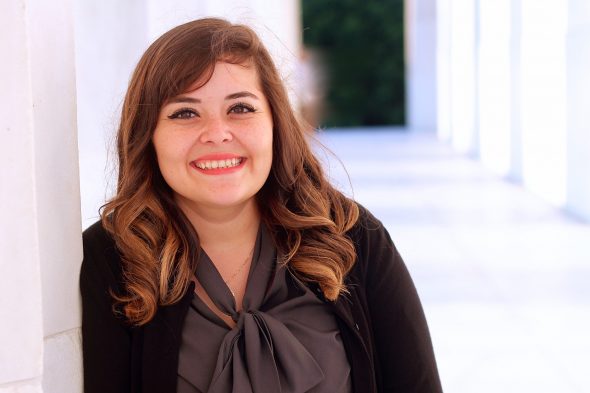Bridge to the Faculty scholar earns prestigious dissertation award
Ivón Padilla-Rodríguez is a socio-legal historian of child migration and a scholar-activist who joined the University of Illinois Chicago as a Bridge to the Faculty postdoctoral research associate and is a member of its 2021 cohort.
She received a doctorate in history from Columbia University, where her research was supported by the Ford Foundation, Harry S. Truman Scholarship Foundation, American Historical Association, American Society for Legal History, and the Immigration and Ethnic History Society, among others.
Columbia University recently awarded her the prestigious 2022 Bancroft Dissertation Award. Since 1963 the honor has been bestowed on no more than two recipients each year to recognize the excellence of their doctoral dissertations relating to American history, diplomacy or international relations.
The Bridge to the Faculty program at UIC aims to attract underrepresented postdoctoral scholars to UIC who can earn a direct transition to a tenure-track junior faculty position after two years.
Padilla-Rodríguez is the daughter of formerly undocumented Mexican immigrants. Her appointment is with the department of history in the College of Liberal Arts and Sciences. Padilla-Rodríguez recently spoke to UIC today about the award, her work and the Bridge to the Faculty program.
What does receiving the award mean to you?
Being selected for the 2022 Bancroft Dissertation Award is an incredible honor. I feel most humbled and validated by the fact that a dissertation that attempts to consider very seriously and with integrity the voices, ideas and agency of migrant youth is recognized by such a distinguished award. What is especially meaningful to me is that Professor Mae Ngai, the mentor who most nurtured my capacity as a scholar and supported my research on child migrants, is also being recognized with a Bancroft Prize this year.
Now that I’m working on revising my dissertation into a book manuscript here at UIC, the award makes me feel even more motivated to bring my research to a broader audience. I am confident the award’s generous publication subvention fund will help me accomplish this goal, which means a lot to me. I also want to add that I am extremely grateful to the rest of my dissertation committee, including Karl Jacoby, Nara Milanich, Pablo Piccato, and George J. Sánchez for nominating me for this award. My committee members provided me with the intellectual feedback and emotional support that undoubtedly facilitated this accomplishment.
What is the topic of your dissertation?
I wrote a dissertation on the social and legal history of Latinx child migration to and within the United States between 1937 and 1986. It examined the multitude of rights violations migrant Mexican and Central American minors faced in the mid- and late-20th century. By sifting through neglected and geographically disparate archival collections from across the country, I carefully traced how U.S. officials used law, policy and the concept of “alienage” to deprive border-crossing youth of rights that were — and continue to be — crucial to the exercise of childhood.
These rights included protection from all of the following: labor exploitation, educational deprivation, prolonged incarceration, family separation and violence. I demonstrated how law and “alienage” nullified migrant minors’ access not just to the rights of childhood — but to childhood itself. My dissertation also helped me show that current immigration policies that rely on injuries to a child or family welfare are not aberrations or recent inventions, but part of a much longer history of child migration.
Can you share some background about yourself that informed your work?
My work, both in and outside of academia, is rooted in the ethical and moral commitments to immigrant communities I developed as the daughter of formerly undocumented Mexican immigrants. My research is the culmination of many intellectual and social exchanges between myself, members of my mixed-status family and the immigrant communities with whom I grew up.
My observations of my mixed-status family and my conversations with my single immigrant mother, aunts and uncles constitute my very first education on the topics of U.S. immigration and border enforcement. This is the education that foregrounds all of my writing, research and advocacy. I also brought these insights with me when I conducted policy research on child and family migration for the U.S. federal government and nonprofits in the U.S. and Mexico. All of my ideas were ultimately devised in conjunction with the immigrants I have had the great privilege to learn from.
As a Bridge to the Faculty member, can you say how the program is serving you and your future?
The Bridge to the Faculty program supports my personal and professional growth in a couple of meaningful ways. First, by providing me the time and resources necessary to focus on my research and writing for two years, the program ensures that I can begin my career as a junior scholar as strongly as possible in preparation for my tenure-track appointment. The Bridge to the Faculty program is making an important material investment in my professional future in this way.
Secondly, and perhaps most importantly, the structured mentorship support and accountability mechanisms facilitated by the Bridge to the Faculty program have already been transformative for me. I feel overwhelmed with gratitude by the amount of one-on-one support provided to me by my UIC mentors such as Amalia Pallares, Angela Walden, Elizabeth Todd-Breland and Adam Goodman. As a first-generation college graduate and the first person in my family to earn a PhD, I benefit from this culturally sensitive mentorship. This mentorship is crucial for me to be able to navigate a successful academic career.
Categories
Topics
Bridge to the Faculty, history, Ivón Padilla-Rodríguez, LAS, Office of Diversity Equity and Engagement

